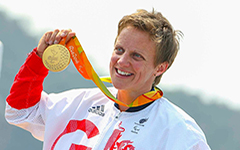Dealing with change – Emma Wiggs’ story
Yesterday (Thursday 10 October) was World Mental Health Day, a day to raise awareness of mental health issues and advocate against social stigma.
In recognition of the day, we spoke to a member of UKAD’s Athlete Commission member and British para-canoeist, Emma Wiggs MBE, on her experiences managing and coping with change in various stages of her life, and her top three tips for others who are going through a transition period. Read her story below…
"I was able-bodied until I was 18, and then on a gap year in Australia between school and university, I unfortunately was struck down by a virus which paralysed me in my arms and legs. Only my arms made a full recovery and I went on to be a teacher, then I eventually found my way in to Paralympic sports about 12 years later. I went to the London Paralympic Games as a volleyball player and then swapped to canoeing post London in early 2013 and never looked back!
From that moment I realised I could make participating in sport a complete part of my life and realised the power of sport in making me feel like I could still achieve what I wanted to achieve. I’ve been lucky enough in my sporting career to win medals on the world stage, including the 2016 Rio Paralympic Games where we received the gold.
For me, sport is absolutely a massive part of my life, but as I get older, I realise you’ve got to have other things that interest you too - that’s where mental health is so important. For athletes specifically, there’s going to be a time when you can’t be an athlete anymore and that can be difficult to come to terms with. It’s the same for people who have been in the same job for a while, it’s so easy to be identified by what you do, not who you are. It’s crucial you identify who you are outside of work, rather than suddenly finding that in my instance for example, you’re no longer going to be Emma the canoeist.
I had an unexpected injury in the past year and had to undergo wrist surgery after an accident in the gym. That was a life changing moment for me because even though I’ve been disabled for 20 years, it was the first time I felt disabled. That probably sounds a bit odd considering I’ve been in a wheelchair for 20 years, however I suddenly went from being able to do everything myself and being fiercely independent to not being able to do anything for myself. That is quite an extreme case, however change can and will happen to everyone. Having the support around me was crucial, but also making sure I put my hand up and asked for help when I needed it was key.
So, here’s my top three tips below for dealing with a transition or period of change.
-
Make time for yourself each day, even if it’s just ten minutes to set up your day, reflect at night, meditate or just be present. It really makes a difference.
-
Be grateful every day, for what we have, those around us, good weather – it can be anything! But recognise it and make a note of it each day.
-
Get enough sleep, anything is more achievable when we feel rested!"
#WMHD201



